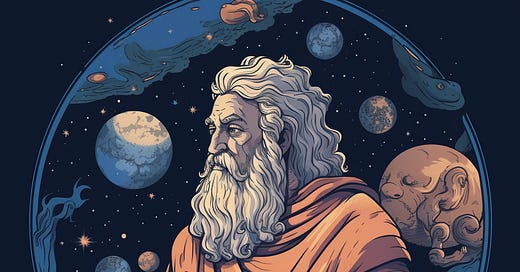How Parmenides laid the foundations for Western Civilization
Parmenides is often overlooked as a philosopher but without the ideas of this pre-Socratic, we'd likely be living in a very different world.
Parmenides of Elea (c. 515–445 BC) was a Greek philosopher from Elea, a Greek colony in southern Italy.
He is considered one of the most important pre-Socratic philosophers, and his work has had a profound influence on the development of Western civilization.
On Nature
Parmenides is best known for his poem “On Nature,” in which he argues that the only thing that truly exists is the unchanging, undivided One (i.e Monism).
He denies the existence of change, multiplicity, and motion, and he argues that the senses cannot be trusted to give us an accurate picture of reality.
Unfortunately not all of this poem has survived by thanks to the work of many much of it has been restored. Peter Kingsley, in particular, has written extensively on the teachings of Parmenides.
His ideas were even highly controversial during his own lifetime and they have been debated by philosophers ever since. However, his influence on Western thought is undeniable.
His ideas about the One have been influential in the development of Platonic idealism, Neoplatonism, and Christian theology. His ideas about change and multiplicity have been influential in the development of Aristotelian realism, skepticism, and empiricism.
The Foundations of Western Civilization
Parmenides’ teachings laid the very foundations for Western civilization in three ways.
First, he provided a new way of thinking about the nature of reality that challenged the traditional Greek view of the world as a place of constant change and multiplicity.
Second, he developed a new method of philosophical inquiry that emphasized the importance of logic and reason.
Third, he helped to lay the cornerstones for the development of Western science by insisting on the importance of empirical evidence.
Parmenides’ New Way of Thinking about Reality
The traditional Greek view of the world was that it was a place of constant change and multiplicity. This view was based on the everyday experience of the senses.
Parmenides challenged this traditional view by arguing that the only thing that truly exists is the unchanging, undivided One. He argued that the senses cannot be trusted to give us an accurate picture of reality because they are constantly deceived by appearances. Instead, we must rely on our reason to understand the true nature of reality.
Parmenides’ Method of Philosophical Inquiry
Parmenides also developed a new method of philosophical inquiry that emphasized the importance of logic and reason.
He argued that we should not rely on our senses or our emotions to understand the world, but instead we should use our reason to deduce the truth about reality.
Aren’t reason and logic the same you might ask? Well, he said no. Reason was based on the conclusions we’d come to thanks to our senses. Logic was above this, it was knowing that out senses deceive us and looking for the true meaning. Parmenides’ idea of logic was actually based on mysticism.
Parmenides’ method of philosophical inquiry was a major breakthrough in the development of Western thought. It laid the foundation for the development of logic and mathematics, and it helped to make philosophy a more rigorous and disciplined discipline.
Parmenides’ Contributions to the Development of Western Science
Parmenides also helped to lay the foundations for the development of Western science by insisting on the importance of empirical evidence.
He argued that we should not rely on speculation or wishful thinking to understand the world, but instead we should base our beliefs on evidence we would arrive at by first using our senses and then using our logic.
Parmenides’ insistence on the importance of empirical evidence was a major step forward in the development of scientific thought.
Hi, I’m Paddy. Thanks for reading my article. I’m a counselor, coach and meditation teacher.
If you’d like to contact me regarding a counseling session or about writing, you can contact me here. My different social media channels are here.






